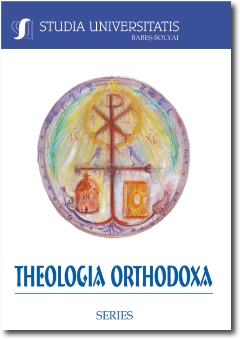O CRITICĂ PATRISTICĂ A LUI FILIOQUE: SF. FOTIE, SF. GRIGORIE AL II-LEA CIPRIOTUL ŞI SF. GRIGORIE PALAMA
A PATRISTIC CRITIQUE OF FILIOQUE: SAINT PHOTIOS THE GREAT, SAINT GREGORY II OF CYPRUS AND SAINT GREGORY PALAMAS
Author(s): Grigore Dinu MoşSubject(s): Christian Theology and Religion
Published by: Studia Universitatis Babes-Bolyai
Keywords: Filioque; Heresies; Photios the Great; Gregory II of Cyprus; Gregory Palamas.
Summary/Abstract: A Patristic Critique of Filioque: Saint Photios the Great, Saint Gregory II of Cyprus and Saint Gregory Palamas. Patriarch Photios, the first one to systematise the Eastern arguments against the Filioque addition, had perceived it as a toned down echo of Pneumatomachism, Sabelian Modalism and Plotinian emanationism and as an innovation which introduced the diarchy within the Holy Trinity. The Tomos of the Constantinople Council of 1285 is extremely significant; drafted by the Ecumenical Patriarch Gregory II, it is the single synodal document of the Orthodox Church which makes a direct, detailed and soundly argued reference to the Filioque, as a teaching in its own right, and vigorously condemns it. Its polemic features aside, the trinitarian theology of the 1285 Tomos has an authentic ecumenical perspective, as it offers the only positive solution to the Filioque controversy: while the Filioque is inacceptable with respect to the divine being, it may be valid with regard to the divine uncreated energies, the eternal manifestation of the divine nature in the Holy Spirit, through and from the Son. Saint Gregory Palamas provided solid biblical, patristic and logical arguments against the Filioque in his two Apodictic Treatises on the Procession of the Holy Spirit of 1333-1334, where he identified within the Latin theology a logic of separation which determines the exegetic de-contextualization, the philological thoroughness, the semantic reduction exclusively compliant to the text’s analysis and internal logic (on a hermeneutic level), and the autonomous rational construction (on a theological level). Consequently, the separation between Orthodox and Filioquist triadology resides in the very theological method. In the latter, dialectic thinking and essentialism prevail, whereas in the former, what takes precedence is the trinitarian understanding of the Holy Spirit, equally apodictic and apophatic, personalistic and ontological: it is the dogmatic of the holistic ‘ecclesial experience’ (spiritual, contemplative and rational) versus the dogmatic of speculative reasoning. To conclude, the Orthodox Church believes that the Filioque has been and still is a trinitarian heresy condemned by the pan-Orthodox councils of 879-880, 1285, 1484, 1583, 1838, as well as by the Holy Fathers of the Church, especially Photios the Great, Gregory II of Cyprus and Gregory Palamas.
Journal: Studia Universitatis Babes-Bolyai - Theologia Orthodoxa
- Issue Year: LVII/2012
- Issue No: 1
- Page Range: 171-186
- Page Count: 16
- Language: Romanian

